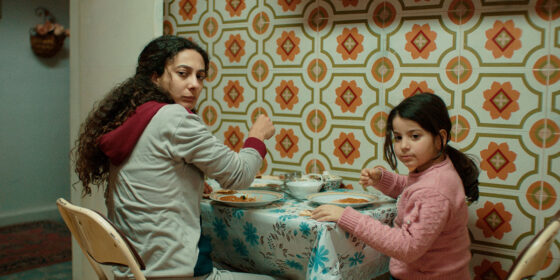TIFF 2023 | Inshallah a Boy (Amjad Al Rasheed, Jordan/France/Saudi Arabia/Qatar/Egypt) — Centrepiece

By Michael Sicinski
An unassuming feminist drama that sneaks up on you, Inshallah a Boy lays out the facts of sexism in Jordan with precision, communicating its protagonist’s exhaustion directly to the viewer. When her husband dies suddenly in his sleep, Nawal (Mouna Hawa) initially receives empathy and blessings, with her friends and relatives working to insure her that she and her daughter Norah (Celina Rababa) will be taken care of. But as the weeks pass, Nawal discovers that her late husband owed substantial debts, and neglected to put the deed of their flat in Nawal’s name. Soon the deceased’s brother Rifqi (Hitham Omari) comes calling, asserting that his side of the family owns half of the apartment and plans to cash it out, leaving Nawal homeless. (As a brutal side note to this expropriation, Rifqi intends to take Norah away to live with his family since, as an unmarried mother, Nawal has few rights under Sharia law.)
Al Rasheed’s debut feature is quite elegant. With an unobtrusive realist style as its bedrock, Inshallah brings Nawal’s emotional conflicts forward in an impressive manner. Neither didactic nor implicitly affirming, the film details the impossible position that women occupy in Jordan, a relatively liberal Muslim state. Most of the people Nawal turns to for help critique her instead, telling her that if she were only more cooperative and less visibly frustrated with patriarchal privilege, she would be facing fewer difficulties. This pervasive attitude includes significant horizontal violence, as well-meaning women insist that the more Nawal demands her rights, the worse her situation will become. Surprisingly she finds her lone ally across class lines, forming a bond with her employer’s daughter Lauren (Yumna Marwan), an educated, secular woman who is also in need.Admittedly, the conclusion of Inshallah is rather pat, resolving many of its crises with a plot development we might call a foetus ex machina. But Al Rasheed allows us to see Nawal’s plight reflected through her relationship with her daughter. The older generation wants Nawal to conform, but the mother, and the film, realize that it’s really Norah’s future—and the future of all Jordanian women—she’s fighting for.
Michael Sicinski

